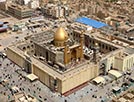Sources of Cannon Law
- Details
- Hits: 2272
Sources of Cannon Law
For the purpose of juristic deduction a Muslim jurist uses various sources of law. The most well‑known of them are the Qur'an, the Sunnah consensus of opinion and reason. We propose to explain them below:
Islam being a Divine religion, revelation is the basis of its legal system. Hence every rule must have Divine sanction.
The rules of law and other items of knowledge were revealed by Allah to the holy Prophet, who conveyed them verbatum to the people. The collection of these revelations was named the Qur'an. Besides that, with the help of the Divine knowledge that he had, the Prophet put forth Islamic teachings or explained and expanded what was contained in the Qur'an. But despite that he was very particular not to say anything which did not have Divine sanction (`We speaks not o f his desire" ‑ Surah al‑Najm,
53:3). Of course, special Divine vigilance always guided him to the right path.
Furthermore, Allah has expressly enjoined the obedience to His Prophet. Therefore, the injunctions issued by the Prophet are as obligatory as the commandments of Allah.
The Divinely designated and installed Imams, though they did not bring any new religion, were described by the holy Prophet as the interpreters of the Divine law and Islamic rules of conduct. They received the knowledge, which they had, either from the Prophet, or it was bestowed on them as a special favour by Allah. Hence what they have said is surely authoritative.
In view of their purity and infallibility and the existence of other definite evidence, not only the actions of the Prophet and the Imams themselves are authoritative, but the actions of others also become authoritative if approved and endorsed by them and can be cited in support of a Divine rule.
Hence the sayings and deeds of the Prophet and the Imams constitute a valuable source of knowing the teachings of Islam. This source, which is called Sunnah or Sirah, is authoritative next to the Qur'an.
Authoritativeness of the Qur'an
The Qur'an will always be existing in its original form. With the precautions taken by the holy Prophet and the watchfulness and co‑operation of the Muslims it has remained unaltered. Hence whatever it contains was no doubt revealed by Allah to the Prophet of Islam. Its being a legitimate source of law is unquestionable.
But to draw inferences from the Qur'anic verses requires a special study of them. Everyone cannot have access to all the contents of the Qur'an. To interpret the verses and to reconcile them keeping in mind all the explanations given in the Sunnah is a matter of specialization. Anyhow, it should not be forgotten that the Qur'an is a Book of clear guidance and all those who know its language can be benefited by it directly. Others can have access to it through its translations. All can be guided by its Light. Only juristic deduction with all its dimensions and limits, anyway, requires a specialization in understanding the Qur'an and the Sunnah.
Utilization of the Sunnah
In the case of the Sunnah the problem is twofold. First we have to sift the traditions to see which of them can be accepted as genuine. Next we have to look into their true import.
There is no doubt that all over history many reports have been fabricated and imputed to the holy Prophet or an Imam. There are many other, traditions the text of which has been altered in one way or the other owing to carelessness or lack of remembrance on the part of the transmitter of the tradition.
Hence it is necessary to ascertain the genuineness of each report, which in itself requires special skill and acquaintance with the personality of the transmitters and with the chains of authority.
If a report is found genuine, then there is the question of its true significance and meaning. For this purpose all relevant reports, which are sometimes conflicting, are to be collected, and their historical background and special language are to be studied.
As such the understanding of the Sunnah also requires specialization in various fields.
Consensus of opinion
Sometimes consensus of opinion (Ijma`) is considered another source of law besides the Qur'an and the Sunnah, in the sense that if the jurists agree to an opinion, we should act upon it even if we do not find anything in the Qur'an and the Sunnah to support it.
The Shi'ah jurists maintain that if some authority is found on a rule of law in the Qur'an or the Sunnah, the question of the consensus of opinion does not arise. A text should always be given preference over a consensus. But if no authority is found and still the jurists have expressed an opinion, we regard it as authoritative, presuming that the jurists must have had some authority in support of their opinion, though we could not find it. In this way the validity of a rule of law even in such cases is actually based on some authority in the Sunnah not known to us.
Reason
Reason plays a basic role in ijtihad. Its role in ascertaining the rules of Islamic law has such an importance that it is said that reason and Islamic law are inseparable. There is a maxim which says:
"Whatever judgement is pronounced by reason is pronounced by Islamic law and whatever judgement is pronounced by Islamic law is pronounced by reason."
While dealing with the question of the Qur'an and the Sunnah we have seen that the deduction of the rules of religious law from these sources requires specialization, and has to be carried out in accordance with certain rules and standards. At all stages of juristic deduction thought and reason are to be applied to it. In one way or the other reason has to be used while restricting the application of a law, giving preference to one report over another or extending the application of a law to other cases on the basis of the generality of its effective cause.
This is the case with regard to those questions concerning which the Qur'anic verses or traditions have come down to us. But there are matters which have not been dealt with expressly by the Qur'an and the Suunah. We know that Islam is an all‑pervasive and ever‑lasting religion. Then what should we do with regard to these matters? In such cases the Islamic cannon law has certain principles and general rules by the application of which and keeping in mind the contents of the Qur'an and the Sunnah, the problem of the new questions can be resolved. This is one of the most difficult stages of juristic deduction.
These principles and rules have either been derived direct from the religious tests and can be utilized only under the guidance of reason, or are basically the axioms which are applied to juristic deduction of Islamic laws.
Role of reason in determining the principles of religion
We already know that Islam wants the people to think for themselves and accept what is right. It does not want them to shut their eyes and ears, nor does it want to impose on them pre‑arranged decisions.
Therefore the use of reason and thinking power is one of the preliminary principles of Islamic cosmology.
We must ascertain the truth and arrive at the fundamental doctrines of Islam with the help of reason, thinking, inference and logic.
We know that as far as the fundamentals of religion are concerned, it is not permissible to follow anyone blindly.
Our belief in them should be based on our own reasoning and faith. Of course, there is no harm if we use the material supplied by revelation in moving forward our ideas. For example, we can be benefited by what the Qur'an has said about Allah in forming our belief about Him. Similarly we can ascertain the truth of revelation by pondering over its sublimity, its excellence, and the perfection of its teachings. By doing so we can arrive at the conclusion that it is really from Allah.
Role of reason in finding out the inimitability of the Qur'an
It is a fact that the inimitablity of the Qur'an is implicit in the Qur'an itself and we can discover it by giving our thought to it. The striking style of the Qur'an, its expressions and its flow on the one hand and its firmness, its comprehensiveness and its valuable teachings on the other, bear witness to the fact that it is a Divine phenomenon and not the product of human effort. Especially when we take into consideration the fact that the Prophet for the first forty years of his life had no concern with any formal or informal education, and then suddenly on being raised to Prophethood he set forth verses which were not only matchless in their style and composition but their content was also very sublime and wonderful, we can have no doubt that the Quran has been revealed by Allah.
The study of the Qur'an and the circumstances in which it was revealed makes it clear that it is the word of Allah.
Philosophy of the rules of law
All those acts which Islam has ordered us to do, have certain advantages and all those acts from which it has restrained us, have certain disadvantages. No Islamic injunctions are without any valid reason behind them.
For example, the eatable and drinkable things, legal relations, etc. have some inherent advantages or disadvantages, whether there exists any law concerning them or not. The Divine commandments are based on those very inherent advantages and disadvantages.
For instance the alcoholic drinks and narcotic substances are harmful irrespective of what the Islamic law says about them. Similarly usury is a big trap used for economic exploitation. Adoration of Allah is purifying and invigorating. If intoxicants and usury are forbidden, that is because they are harmful. If prayers have been enjoined, that is because of its beneficial effect on human beings.
Thus all rules of Islamic law are based on advantages and disadvantages, which are to a certain extent comprehensible with the help of knowledge and experience, and that is why it is not forbidden to inquire about the advantage or philosophy of any rule.
We find quite a number of traditions which give the reasons and philosophy of many religious injunctions. Such traditions have been collected by several authors in their books under the heading of the Philosophy of Islamic Law known as "Ilalush Shara`ih".
Even in the Qur'an we find again and again that Allah, while enunciating a rule hints at its advantage and effect. For example, prayers have been described as preventing from indecent acts and fasting as impelling to piety.
Now the question is whether we can extend a rule to other similar cases, if we definitely know its effective cause, that is, the advantages or disadvantages on which it is based. We can do so only if the cause, is expressly stated in the Qur'an or the Sunnah. Otherwise if we know only partly the considerations on which a rule of law is based, or only conjecture about them, we have no right to interpret a text according to our own whim, or make our personal opinion the basis of Divine law. We are not allowed to use defective analogy in juristic reasoning or to invent an extendible cause of any rule of Islamic law.
Development of Islamic law does not mean the use of personal opinion in juristic deduction, nor does the big role of reason and thought in the deduction of religious injunctions justify the introduction of personal fancy in the sphere of religious law.
Connection between Ijtihad and finality of Islam
We have ample evidence in the Qur'an and the Sunnah to show that Islam is the last revealed religion. While discussing the characteristics of the `Age of Appearance', we observed that it would be the period of the final victory of the right and justice and complete supremacy of the social system of Islam.
Now we propose to study some of those aspects of Islam which bear out its finality.
(1) In contrast with the books of other religions the Qur'an, which is replete with knowledge and the rules of law, has remained unaltered. The depth and dimensions of this intellectual and spiritual store of Divine guidance are unparalleled.
Concerning the Qur'an the holy Prophet has said:
"Outwardly it is beautiful and inwardly it is deep. Every verse of it has an inner kernel and that kernel has another kernel. Its splendour will never never fade out".
Imam al Sadiq (P) was asked: "Why does the Qur'an appear to be so new and fresh though it is read and taught so much". The Imam said: "It has not been revealed for any particular time or any particular people. So it is fresh at all times and looks glorious to every people".
(2) We possess the rich sources of the Sunnah and Sirah to which we have referred earlier. They contain the history and the life account of the Prophet of Islam and the Imams. There exists no such record of the life of any prophet of the past. Especially on the life of the holy Prophet there are hundreds of books in which even the minutest details of his personal and family life have been recorded. The fact that some of these books were compiled not long after the period of the holy Prophet adds to their reliability. The existence of such a record of the life of its leader is necessary for a living and everlasting movement.
(3) The doctrine of Ijtihad which we have described in detail, meets all the requirements presented by new problems, and keeps the way of the intellectual and social development of Islam and its teachings open. It guards the purity and original character of the religion and at the same time keeps it fresh and moving.
(4) The introduction of reason in the sphere of religious teachings helps the progress of thought in the discovery of hitherto unknown aspects of religion.
At the same time the existence of general, legal and intellectual rules and relevant principles facilitates the work of juristic research.
All these aspects preserve Islam's position as an everlasting, all‑pervasive and universal religion.











